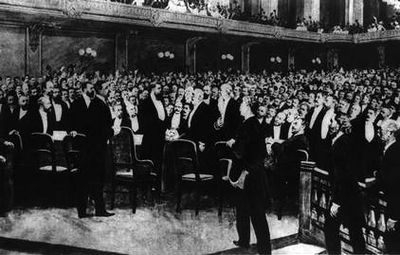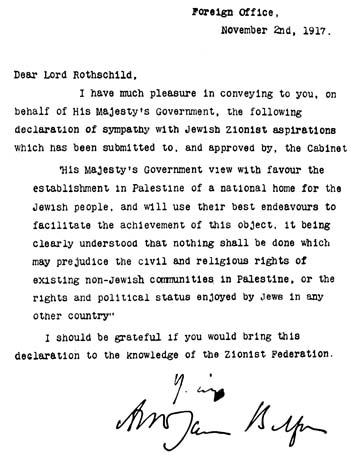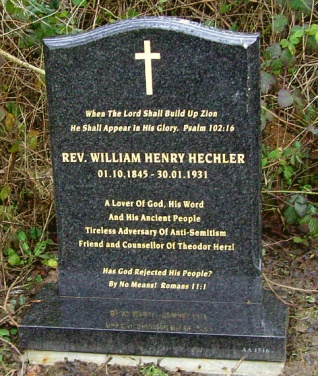10 March 1896 Theodore Herzl meets Protestant Clergyman and Christian Zionist William Hechler
Reverend William Henry Hechler (10 January 1845 – 31 January 1931) was a Restorationist Anglican clergyman, eschatological writer, crusader against anti-Semitism, promoter of Zionism, aide, counsellor, friend and advocate of Theodor Herzl as he developed his vision and plans for the return of the Jewish people to the Land. He was “not only the first, but the most constant and the most indefatigable of Herzl’s followers”, according to Paul Merkely – The Politics of Christian Zionism 1891-1948.
Herzl records a meeting with Hechler on 10 March 1896 in his diary:
‘The Reverend William Hechler, Chaplain of the English Embassy here, came to see me. A sympathetic, gentle fellow, with the long grey beard of a prophet. He is enthusiastic about my solution of the Jewish Question. He also considers my movement a ‘prophetic turning-point’ – which he had foretold two years before. From a prophecy in the time of Omar (637CE) he had reckoned that at the end of forty-two prophetic months (total 1260 years) the Jews would get Palestine back. This figure he arrived at was 1897-98.’
In March 1897, the year Hechler expected the Jews to begin returning to Palestine, Herzl described their second meeting at Hechler’s apartment. Herzl was amazed to find books from floor to ceiling, ‘Nothing but Bibles’ and a large military staff map of Palestine made up of four sheets covering the entire floor of the study:
‘He showed me where, according to his calculations, our new Temple must be located: in Bethel! Because that is the centre of the country. He also showed me models of the ancient Temple. ‘We have prepared the ground for you!’ Hechler said triumphantly … I take him for a naive visionary … However, there is something charming about his enthusiasm … He gives me excellent advice, full of unmistakable genuine good will. He is at once clever and mystical, cunning and naive.’
Despite Herzl’s initial scepticism, Hechler kept his word and gained access to the German Kaiser William II, the Grand Duke of Baden as well as the British political establishment for Herzl and his Zionist delegation. Although sympathetic to the evangelistic ministry of the LJS, Hechler’s advocacy and diplomacy marked a radical shift in Christian Zionist thinking away from the views of early restorationists like Irving and Drummond who saw restoration to the land as a consequence of Jewish conversion to Christianity. Now, Hechler was insisting instead, that it was the destiny of Christians simply to help restore the Jews to Palestine.
Prayer: Lord, you alone allot the territories, times and seasons to all nations. You know their histories, homelands, tragedies and triumphs. Yet you reveal your purposes to us weak human beings, and in some strange way you invite us to participate in the fulfilment of your purposes. It is clear that you allowed this eccentric clergyman to play a pivotal role in the formation of Theodor Herzl’s life, and the development of Zionism. Thank you for the walk-on parts that you give each of us to play on the stage of human history. Help us as Messianic Jews to play our parts with faith, hope and love. To you alone we give glory, O Lord of space and time, who will one day return to restore Israel, the nations and all creation. We pray even today for peace, reconciliation, healing and reconciliation in Israel/Palestine, and for justice and security for all in Your Land. In Yeshua’s name we pray. Amen.
http://en.wikipedia.org/wiki/William_Hechler
Theodor Herzl, The Diaries of Theodor Herzl, (New York, 1956),
More here:
“Yesterday, Sunday afternoon, I visited the Rev. Hechler. Next to Colonel Goldsmid, he is the most unusual person I have met in this movement so far. He lives on the fourth floor; his windows overlook the Schillerplatz. Even while I was going up the stairs I heard the sound of an organ. The room which I entered was lined with books on every side, floor to ceiling.
Nothing but Bibles.
A window of the very bright room was open, letting in the cool spring air, and Mr. Hechler showed me his Biblical treasures. Then he spread out before me his chart of comparative history, and finally a map of Palestine. It is a large military staff map in four sheets which, when laid out, covered the entire floor. “We have prepared the ground for you!” Hechler said triumphantly. He showed me where, according to his calculations, our new Temple must be located: in Bethel! Because that is the center of the country. He also showed me the models of the ancient Temple. He sang and played for me on the organ a Zionist song of his composition… But I take him for a naïve visionary with a collector’s enthusiasm, and I particularly felt it when he sang his songs to me.”
In his diary, Herzl records his true motivation for coming to see Hechler. Herzl needed Hechler. Herzl had no access to the German Royal family and international legitimacy. He needed Hechler to help gain him entre and hence recognition by a great European power of his ideas re: Political Zionism. Herzl continued in his diary.
“Next we came to the heart of the business. I said to him: I must put myself into direct and publicly known relations with a responsible or non responsible rule – that is, with a minister of state or a prince. Then the Jews will believe in me and follow me. The most suitable personage would be the German Kaiser. But I must have help if I am to carry out the task. Hitherto I have had nothing but obstacles to combat, and they are eating my strength.” Hechler immediately declared that he was ready to go to Berlin and speak with the Court Chaplain as well as with Prince Gunther and Prince Heinrich. Would I be willing to give him the travel expenses? Of course I promised them to him at once. They will come to a few hundred guilders, certainly a considerable sacrifice in my circumstances. But I am willing to risk it on the prospect of speaking with the Kaiser. …To be sure, I think I detect from certain signs that he is a believer in the prophets. He said, for example, “I have only one scruple: namely, that we must not contribute anything to the fulfillment of the prophecy. But even this scruple is dispelled, for you began your work without me and would complete it without me.”………..He considers our departure for Jerusalem to be quite imminent and showed me the coat pocket in which he will carry his big map of Palestine when we shall be riding around the Holy Land together. That was his most ingenious and most convincing touch yesterday.”[5] Hechler left for Berlin almost immediately but failed to speak with the Kaiser. He returned with a different plan, a different path to the Kaiser. Herzl was a political neophyte and did not know what to do.
On 23 April 1896 Herzl wrote in his diaries of his arrival in Karlsruhe at Hechler’s request.
“Arrived here at eleven last night. Hechler met me at the station and took me to the Hotel Germania, which had been “recommended by the Grand Duke.” We sat in the dining-room for an hour. I drank Bavarian beer, Hechler milk. He told me what had happened. The Grand Duke had received him immediately upon his arrival, but first wanted to wait for his privy-councilor’s report on my Jewish State. Hechler showed the Grand Duke the “prophetic tables” which seemed to make an impression. When the Kaiser arrived, the Grand Duke immediately informed him of the matter. Hechler was invited to the reception and to the surprise of the court-assembly the Kaiser addressed him with the jocular words: “Hechler, I hear you wanted to become a minister of the Jewish State.”
Two days later, on 25 April, Hechler brought a very nervous Theodor Herzl[6] to a private audience with the Grand Duke. It was the first time that Herzl was able to share his vision of Political Zionism and his solution to the “Jewish Problem” with German royalty. The Grand Duke was very taken with Hechler’s eschatological predictions and with Herzl’s pragmatic solution to the Jewish problem through restoration of the Jews to Palestine. The Grand Duke became a lifelong advocate of Herzl and the Zionist cause. He used his office and his relationship with his nephew, Kaiser Wilhelm II to support Herzl and Zionism.
Reverend William Hechler was 59 years old when Theodor Herzl died. He remained Chaplain of the British Embassy until 1910, when a new ambassador, arrived who was less tolerant of Hechler’s theism. Hechler retired to Great Britain. Hechler was remembered in Vienna not only for his eccentricities and his support of Zionism but for being a founding member of the First Vienna Football (Soccer) Club. In retirement, Hechler continued spreading the word about Zionism, Herzl and Restorationism. He befriended many people including the great philosopher Martin Buber, the great portrait painter Philip de Laszlo and the head of Scotland Yard, Robert Anderson. Hechler was actively against World War I, which put an end to his romantic dream of unity between the British and German peoples. He may have met Bertha Suttner, the Austrian pacifist.[1] In 1918, Hechler warned the Jewish world that a terrible calamity was coming, one that was of horrific dimensions if the Jews did not return to Palestine. Hechler was 73 years old and had been out of the areas of Jewish influence for a long time. The Jewish community ignored him. Beginning in the late 1920s the Zionist Executive provided a small monthly pension of 10 pounds to Hechler. He worked for Mildmay Hospital,[8] in a minor clerical position, until shortly before his death in 1931. He died alone, leaving the not inconsiderable sum of £1954 16s 11d in his will, living at 80 North Hill Highgate at the time, [9] [although he died in Mildmay hospital] and was buried in an unmarked grave in New Southgate Cemetery, London.[10] In 1934, the Jewish community of Vienna proposed a statue be erected in honor of Reverend Hechler. It was never done. Vienna, by 1934, was already rapidly on the road that would lead to National Socialism (Nazism) and the Jewish Holocaust. Austria was absorbed into Germany during the Anschluss of February 1938.








Reblogged this on Talmidimblogging.
LikeLike